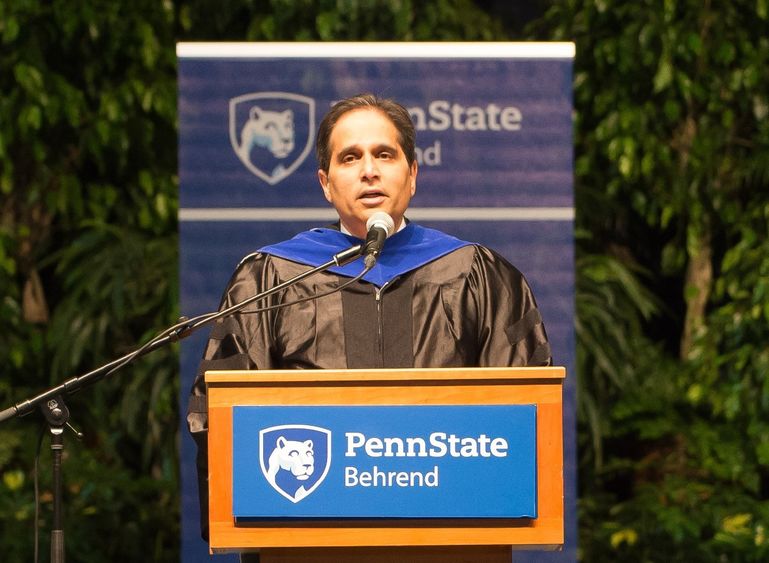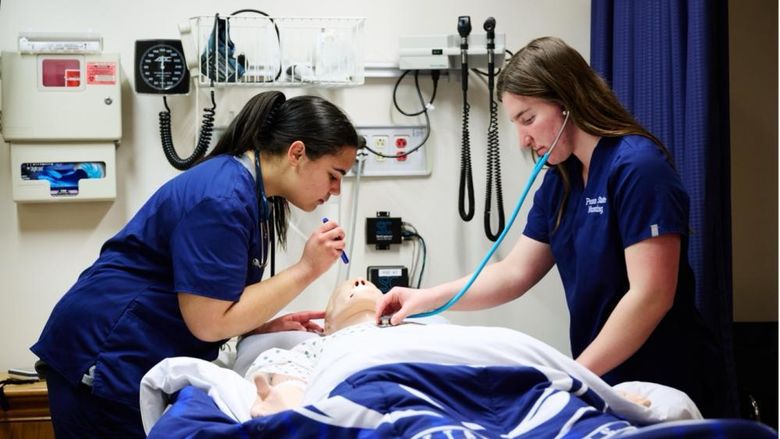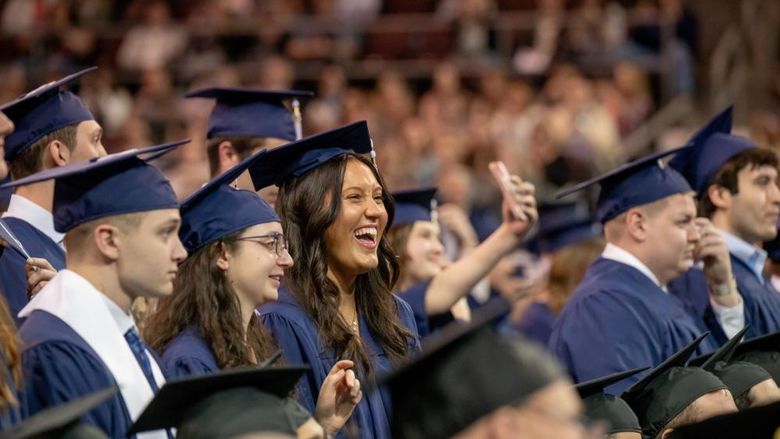
Ashutosh Deshmukh has been named distinguished professor of accounting and management information systems at Penn State Behrend. He joined the faculty at Behrend in 1993.
ERIE, Pa. — Ashutosh Deshmukh didn’t plan to be a college professor, but his path has led him to the profession’s highest rank at Penn State: He has been named distinguished professor of accounting and management information systems.
The designation of distinguished professor recognizes outstanding academic contributions to the University and service to students. Deshmukh joins two other Penn State Behrend faculty members in holding the title: Michael Campbell, distinguished professor of biology, and George Looney, distinguished professor of English and creative writing. Retired faculty member John Gamble, distinguished professor of political science and international law (emeritus), continues to hold the title as well.
We asked Deshmukh, who joined the faculty at Behrend in 1993, about his career, what he believes makes a great professor, and how a 19-year-old accountant from what was then Bombay ended up in Erie.
Have you always wanted to be a professor?
I was an accountant before coming to the United States to earn an MBA at the University of Alabama. As part of my assistantship there, I taught calculus and algebra to undergraduate students. There, I was also exposed to research in accounting and business. That was when I began to consider a career in academia.
What did you do before coming to Behrend?
I got my bachelor’s degree when I was just 19, and I started working in public accounting, eventually becoming an audit manager. One interesting aspect of that job was auditing the Bollywood production houses. Even today, as a hobby, I track cash collections and profits of many Hollywood movies. After some time, I began working as a management accountant and got involved in the computerization and automation of business processes, which led me to the United States to further my education.
I earned my MBA at the University of Alabama and a Ph.D. at the University of Memphis.
What classes do you teach now?
I primarily teach accounting, but I have some expertise in the management information systems area, too. Currently, I am teaching auditing for seniors and advanced auditing for graduate students. I also created a course, “Managing in the Digital Economy,” for the online MBA program. I have taught that for several years.
My current adventure is leading a course in Microsoft Excel, which is a very hands-on course.
You completed your undergraduate work in Bombay, which today is known as Mumbai. How did you end up at the University of Alabama?
Serendipity! I applied to the University of Alabama because schools were listed alphabetically, and it was at the top of the list. I was admitted to higher-ranking schools, but I had a limited amount of money, which I could stretch further at Alabama.
I was guided to Alabama by luck and fate — and sound financial reasoning.
Do you return to India often? Do you miss anything about life there?
My wife and I go to India at least once a year, sometimes more, to visit her father, who is 88 and still lives alone.
Unless you have visited a city like Tokyo, Hong Kong, or Bangkok, you cannot imagine Mumbai. In the United States, the closest approximation is New York City. I certainly miss the pace and energy of the place, but I can no longer tolerate the pollution and noise, or eat food from street vendors. I also will no longer drive in the city. I can drive in Chicago and New York without any problems, but not in Mumbai!
What do you enjoy about teaching?
It’s a multi-faced activity. It demands that you be on top of your subject matter, be able to simplify and communicate complex issues easily, be able to motivate and energize students, stoke the curiosity of your audience, and, most importantly, give students survival skills to make it in the messy real world.
No one teacher is perfect in all these ways all of the time, but the challenge of doing well in as many dimensions as I can is what I relish most about teaching.
What is the most important quality for a professor to possess?
Mastery of the subject matter and the ability to explain it in the simplest terms are the most important qualities for a professor.
Ernest Rutherford, a renowned physicist, used to say that if you cannot explain your latest theory to a bartender, then you don’t understand the theory. And he was talking about nuclear physics!
In 2020, we had to quickly transition classes to the remote-learning environment. Was that any easier for you, because of your experience in the online MBA program?
My courses were always structured to go online at a moment’s notice. I did so not because it was required, but because I liked the discipline it imposed on me.
When the pandemic struck, I was teaching in online, hybrid and residential formats. We did not miss a beat, going online.
What advice do you have for professors in the first years of the career?
The important things have never changed: Focus on your teaching and research agendas, learn all you can about the institution, get involved, get to know the students, and enjoy the journey.
Heather Cass
Publications and design coordinator
Penn State Erie, The Behrend College



